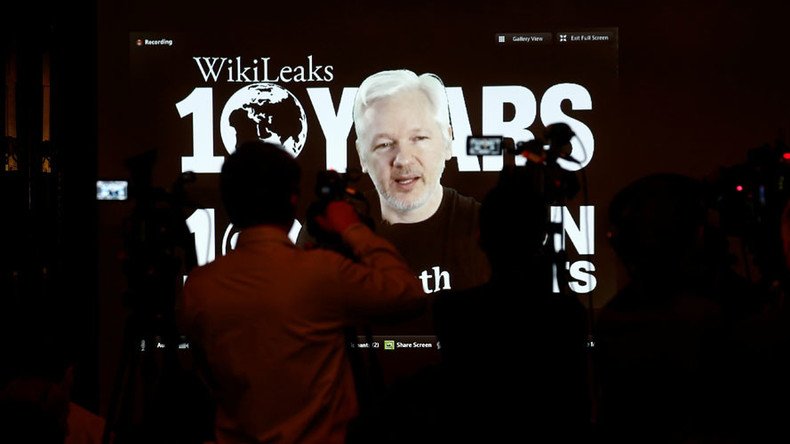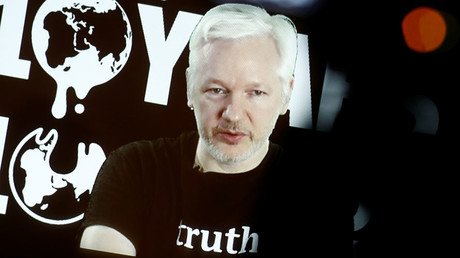'Julian Assange losing internet access possible US cyber attack'

It is unlikely that Ecuador, supporting whistleblower Julian Assange, deprived him from the opportunity to use internet, says Peter Van Buren, former officer, US State Department's Foreign Service. The countries like the US have much more reasons for that, he added.
According to Wikileaks’ twitter feed, Ecuador cut off Julian Assange’ internet access on Saturday. The same day more than a dozen Wikileaks members reportedly had their Internet and phone connections cut.
RT: Wikileaks claims Assange's Internet access has been cut by Ecuador. What do you make of this? Could there be a third party involved here?
Peter Van Buren: It is difficult to surmise an explanation why Ecuador would have cut his internet services. Assange has been living in the Ecuadorian embassy for so long; there has been no political change in the Ecuadorian government. I can’t even take a guess why they might have done that to him.
We can confirm Ecuador cut off Assange's internet access Saturday, 5pm GMT, shortly after publication of Clinton's Goldman Sachs speechs.
— WikiLeaks (@wikileaks) 17 октября 2016 г.
At the same time, imagining the reasons a third party might have cut that internet access are fairly easy to do. Assange has embarrassed the US government. The US government has made claims that he is working with the Russians, and that the Russians with Assange are trying to disrupt or interfere in America’s election. And we’ve seen reports over the weekend that the US is planning some form of retaliation in cyberspace. It is not unlikely that that retaliation may include poking the bear in the nose, perhaps starting with cutting off Assange’s internet access.
RT: Presuming that was Ecuador who cut the internet connection, do you think there is a possibility they were forced to do that?
PVB: It is always possible. At this level of politics it is difficult to say anything isn’t possible. I would say unlikely, however. Ecuador has supported Assange through a number of difficult times. The government in Ecuador hasn’t changed. The people in Ecuador who were supporting him before seem to be supporting him now. Certainly if they wanted to do something against Assange they have very powerful tools, including simply turning him out of the embassy. I can’t rule anything out, but I can’t say I can think of a good reason why Ecuador would be the culprit here.
RT: It's also been reported that over a dozen Wikileaks members have also experienced Internet and phone connection cuts today. Is that a coincidence?
PVB: Coincidences do happen, but not as often as we would like to think they do. Assuming that Ecuador doesn’t control the internet access for all of those people, that certainly raises the questions about who is behind the door of this. Leaving coincidence aside, you look at nation state-level actors in order to affect those kinds of changes across a broad group of people, across different national borders. Looking at the threats over the weekend of the US to retaliate, it wouldn’t be outside the realm of possibility that this is maybe a first shot the US has fired.
Depriving Assange of internet access clear violation of human rights
The British and the Americans have not been happy with Wikileaks exposing their violation of international law, so they might be the ones breaching human rights and cutting off Assange’s network, said Curtis Doebbler, international human rights lawyer.
More than a dozen Wikileaks members have had their Internet and phone connections cut. Only hours before, the whistleblower group's chief Julian Assange also had his Internet severed. It's been called an intentional state act. That's according to a post on the organization’s twitter page. The Internet is one of the only links Julian Assange has to the outside world, given he's been holed up in Ecuadorian embassy in London for the last four years. More than a dozen Wikileaks members have had their Internet and phone connections cut. Only hours before, the whistleblower group's chief - Julian Assange - also had his Internet severed.
#wikileaks: Assange's internet link has been intentionally severed by a state party https://t.co/octsMsvX5z
— RT (@RT_com) 17 октября 2016 г.
RT: Wikileaks claims Assange's Internet access has been cut by a state actor. What's your take on that?
Curtis Doebbler: I think certainly in Julian’s case it is very likely that a state actor has interfered his internet access. More importantly, if it is a state actor that did this, then it is a clear violation of international human rights law that applies to most states.
RT: Who do you think might be behind the attack?
CD: Well, as you know the US has not been happy with his exposing their violations of international law. And of course the British, a close US ally has kept him pinned in the Ecuadorian embassy for more than a half decade. Those two would probably be the first suspects. They have the technology to do such a thing. But what would be very unfortunate, no matter what the reason they did it, is that this would be a clear violation of Julian’s human rights – something that the US is bound to protect as a member of the Organization of American states; and the UK is bound to protect, as they have ratified the European Convention on Human Rights.
The statements, views and opinions expressed in this column are solely those of the author and do not necessarily represent those of RT.














